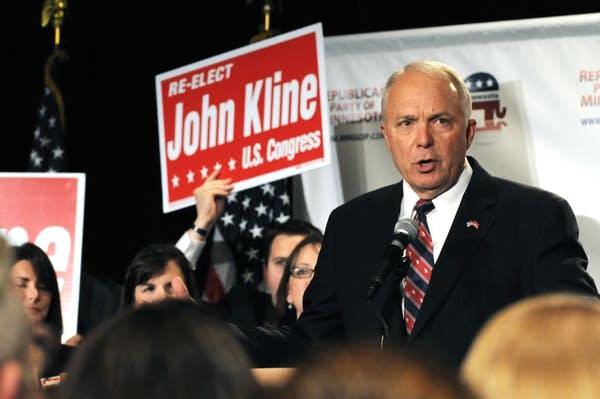Minn. incumbents head back to a very different Congress
Go Deeper.
Create an account or log in to save stories.
Like this?
Thanks for liking this story! We have added it to a list of your favorite stories.

With the defeat of 18-term Democrat Rep. Jim Oberstar and the Republican takeover of the U.S. House, Minnesota's Congressional delegation will see significant change.
The DFL side of the congressional delegation is losing its power.
Though Rep. Betty McCollum easily won re-election to her seat in the 4th District, she'll part with her spot as Senior Democratic Whip within the House Democratic Caucus.
And 7th District Congressman Collin Peterson will be dethroned as head of the Agriculture Committee.
Turn Up Your Support
MPR News helps you turn down the noise and build shared understanding. Turn up your support for this public resource and keep trusted journalism accessible to all.
Washington University political scientist Steven Smith said Peterson's descent won't be a radical shift as the Agriculture Committee is one of the least partisan committees in Congress. As a result, Peterson's move from chair to ranking minority member will likely not mean that his voice is silenced.
"Nevertheless, domestic discretionary spending is going to be under a great deal of pressure in this new congress," Smith said. "And having a strong defender of ag interests, an experienced member close to leadership is important."
Smith said on the whole, the new Republican majority has run on an anti-pork platform. That means Minnesota will likely get less in terms of pork and earmarks -- the provisions and bills that isolate individual projects.

Minnesota will get a bump in clout from the ascent of 2nd District Rep. John Kline to the head of the Education and Labor Committee. On that committee, partisan and ideological differences matter a lot and shape the legislation coming out of it, said Kathryn Pearson, a political science professor at the University of Minnesota.
"You can definitely see a policy imprint in the type of bills that come out of this committee. If Democrats control Congress, they tend to favor labor," she said. "When Republicans control Congress, they tend to be more critical of labor, there tend to be investigations of labor unions."
At the Minnesota GOP election headquarters in Bloomington, Kline said he wants to use his committee chairmanship to shepherd smaller, more manageable pieces of legislation.
"We'd like them to be clear and concise and make sure every member has a chance to participate, do more than read it, but participate in the crafting of legislation, whenever possible," he said. "I think you're going to see a different process, which normally I think the American people don't pay that much attention to, but they are now. I think there are too many stories of backroom deals."

Kline said one of his big priorities will be looking at how to reform the federal No Child Left Behind legislation.
Experts agree that Republican Rep. Michele Bachmann, who handily won re-election in the 6th District, is too junior to be in line for a powerful committee post. But the two-term congresswoman, who raised more money than any other House candidate, has garnered a national reputation as the head of the tea party caucus.
Her name has been cropping up in media reports this week as the potential Republican Conference Chair. That job involves things like coordinating media strategy and meetings of the Republican caucus.
"I did receive calls in recent days asking me to consider something like that," she said. "Quite honestly, it's about where can I serve the best."

Bachmann hasn't said whether she will support John Boehner, who's widely expected to become Speaker of the House. Last night, she didn't say whether she would defer to him in articulating Republican goals, something Steven Smith said could become an issue.
"Boehner will want to frame the issues and shape the party's reputation as he sees fit," said Smith. "There will be competitors, and people like Michele Bachmann will have to decide if they want to step in and compete with the elected leaders in interpreting the mandate they've received."
Meanwhile, experts agree that Bachmann's championing of the tea party caucus could enhance her influence, especially if that group becomes a swing vote that other Republicans need to court.
----
The seven incumbents who won Tuesday did so without much trouble:
* Democratic Rep. Tim Walz held off Republican Randy Demmer, 50 percent to 43 percent, in Minnesota's 1st District in southern Minnesota.
* Republican Rep. John Kline defeated Democrat Shelley Madore, 64 percent to 36 percent, in the 2nd District in the south metro.
* Republican Rep. Erik Paulsen beat out Democrat Jim Meffert, 59 percent to 37 percent, in the 3rd District in the west metro.
* Democratic Rep. Betty McCollum defeated Republican Teresa Collett, 59 percent to 35 percent, in the 4th District in St. Paul.
* Democratic Rep. Keith Ellison was far ahead of Republican Joel Demos, 69 percent to 24 percent, in the 5th District in Minneapolis.
* Republican Rep. Michele Bachmann pulled off her re-election bid against Democrat Tarryl Clark, 52 percent to 41 percent, in the 6th District in St. Cloud and the north metro.
* Democratic Rep. Collin Peterson held off Republican Lee Byberg, 56 percent to 38 percent, in the 7th District in western and northwestern Minnesota.
(MPR News reporter Elizabeth Dunbar contributed to this report.)
Dear reader,
Political debates with family or friends can get heated. But what if there was a way to handle them better?
You can learn how to have civil political conversations with our new e-book!
Download our free e-book, Talking Sense: Have Hard Political Conversations, Better, and learn how to talk without the tension.







